The 3 Best Hearing Aids for Tinnitus in 2025 (Audiologist Reviewed)
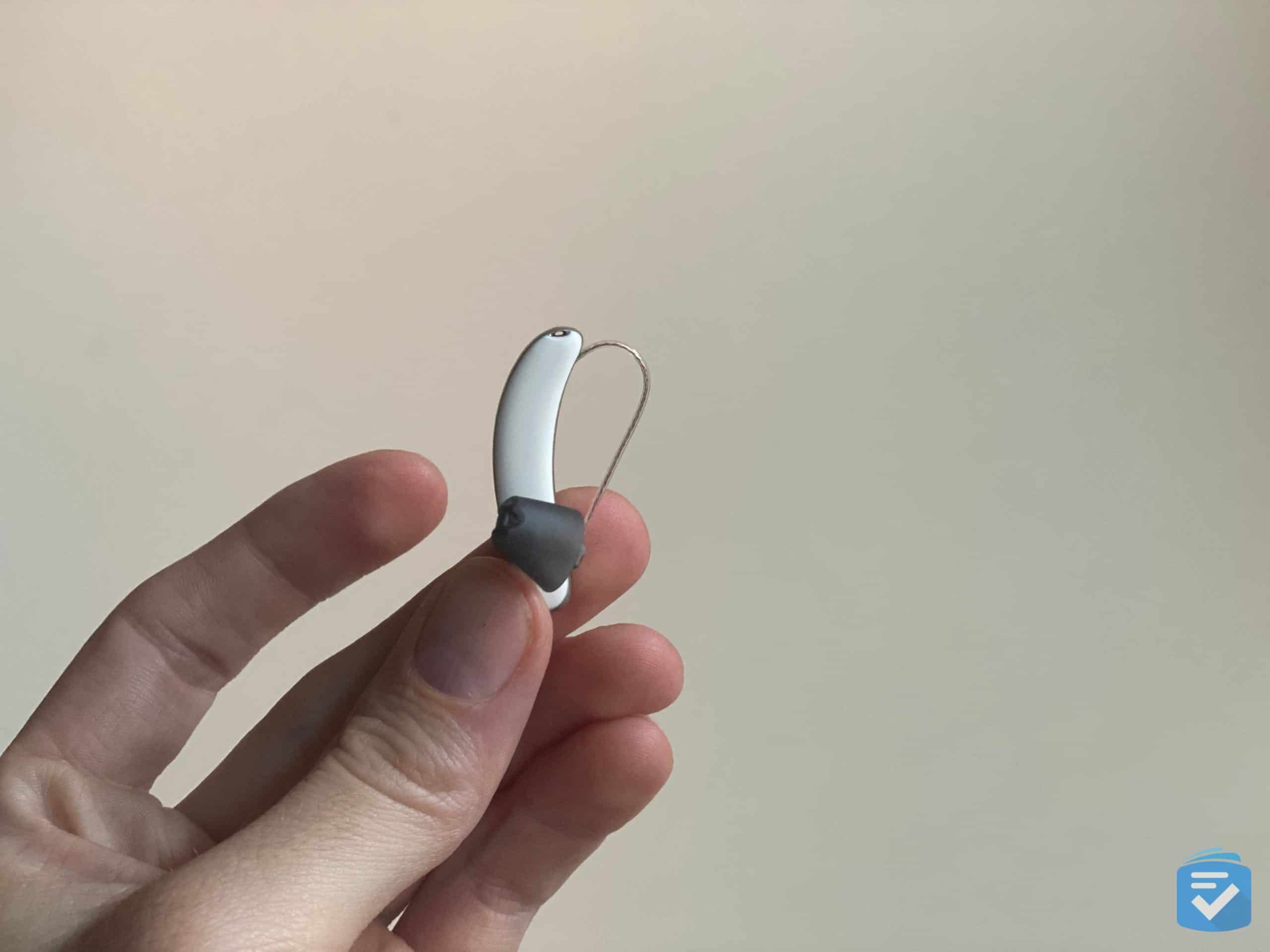
Key Findings
- Tinnitus affects nearly 50 million Americans, and hearing aids are among the best ways to mitigate its symptoms.
- Jabra Enhance hearing aids have a dedicated tinnitus manager on the Jabra app, allowing users to mask sounds.
- Eargo hearing aids come with lifetime remote support from hearing specialists who can help fit your hearing aids to mask tinnitus symptoms.
- While more costly, Signia hearing aids feature ample tinnitus therapies that can mitigate symptoms.
FYI: To learn more about our favorite hearing aids overall, check out our rundown of this year’s best hearing aids.
Why Trust TheSeniorList?
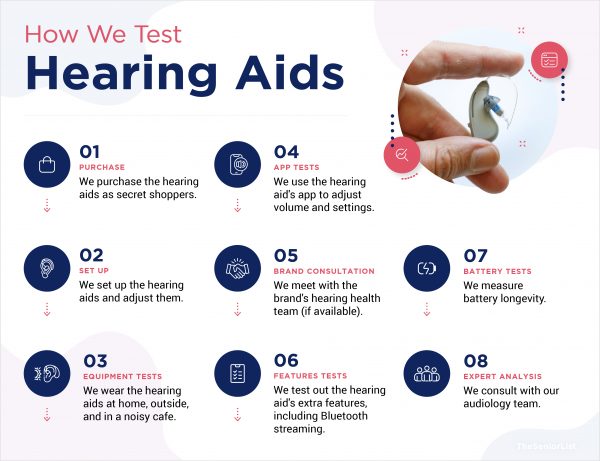
To create this list, our team tested 30 different hearing aids from 12 brands. In choosing our favorite hearing aids for tinnitus, we used the following criteria:
- Tinnitus-specific programs: While there is no cure, certain hearing aids have a feature that allows them to play sounds that mask or cover up tinnitus-related sounds in your ears; it’s almost like a white noise machine. You can choose to turn the masking sound on or off while still maintaining the amplification. These masking programs can greatly reduce the strain and stress of tinnitus symptoms for some people who find tinnitus excessively bothersome.
- Price: Hearing aids can cost up to $6,000 for a pair, but we gave preference to options that cost far less than this.
- Extra features: Smartphone adjustments, Bluetooth streaming, and wind reduction are all among the extra features that can make hearing aids better to use. We accounted for these as well.
- Customer support: If your primary goal with hearing aids is tinnitus management, good support from your hearing health-care provider is essential; it starts with setting up tinnitus-masking programs and continues through helping with troubleshooting issues quickly. Some people need a lot of support, while others need very little. Choosing a product and provider with the level of support you need is important.
The Best Hearing Aids for Tinnitus
- Jabra Enhance Select 500 : Dedicated Tinnitus Management
- Eargo 6 : Lifetime Customer Support
- Signia Styletto AX : Best Tinnitus Therapies
Our Top Picks Compared
|
Jabra Enhance Select 500
 |
Eargo 6
 |
Signia Styletto AX
 |
|
|---|---|---|---|
| Rating out of 5 | 4.5 | 4.2 | 4.5 |
| Cost for a Pair | $1,795 – $1,995 |
$2,250 |
$2,500 – $5,000 |
| Tinnitus Programs | Yes |
No |
Yes |
| Standout Features |
|
|
|
Our Top Picks
Jabra Enhance Select 500 - Dedicated Tinnitus Management
 View Packages
Links to Jabra Enhance
View Packages
Links to Jabra Enhance
What We Like Most:
- Personal support from trained audiologists
- Small, lightweight, and easy to wear
- Adjustable settings via app
- Bluetooth audio streaming

Overview
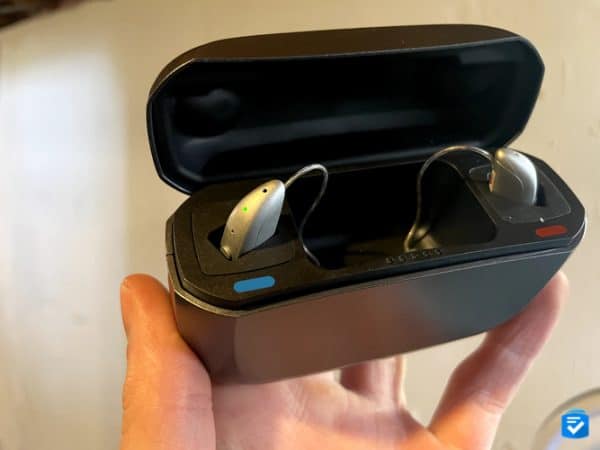
Cost for a pair: $1,795 -$1,995
Jabra Enhance hearing aids are among our favorites due to their affordable pricing, ample support, and long-lasting batteries — not to mention the included three-year warranty. And while all of their hearing aid models have similar tinnitus features, our favorite would have to be the Jabra Enhance Select 500.
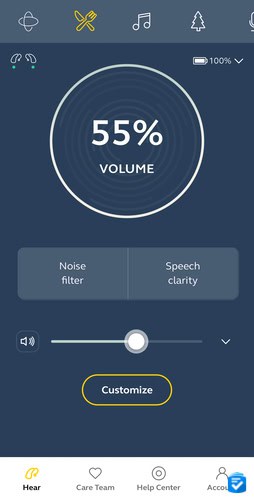
The Jabra Enhance Select 500’s smartphone app allows you to schedule telehealth calls with audiologists and adjust the sound settings on your hearing aids. Additionally, it features a dedicated “tinnitus manager.” This feature, when activated, allows you to set up varied sound therapies that can help drown out related symptoms. In our experience, many people living with tinnitus have found this feature helpful.

To learn more about Jabra Enhance’s hearing aids, check out our Jabra Enhance hearing aids review.
Pros
- Dedicated tinnitus therapies
- Useful smartphone app
- Call and music streaming
- Up to three-year warranties
Cons
- Not suitable for severe hearing loss
- No invisible models
To learn more about Jabra Enhance’s hearing aids, check out our Jabra Enhance review.
Eargo 6 - Lifetime Customer Support
What We Like Most:
- Long-lasting rechargeable batteries
- Virtually invisible fit
- Lifetime licensed support
- Great sound quality
Overview
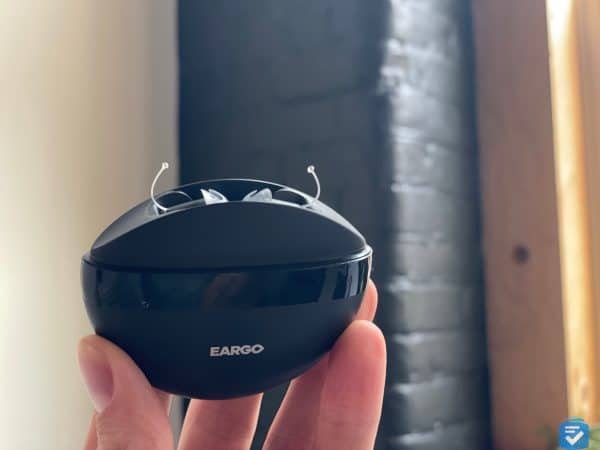
Cost for a pair: $2,250
With four different models to choose from, Eargo is one of the best hearing aid brands that sells directly to consumers. Their latest model, the Eargo 6, improves upon those prior with automatically adjusting sound profiles, longer-lasting rechargeable batteries, and IPX7 water resistance. Costing under $100 per month when financed, Eargo 6 prices are also competitive.
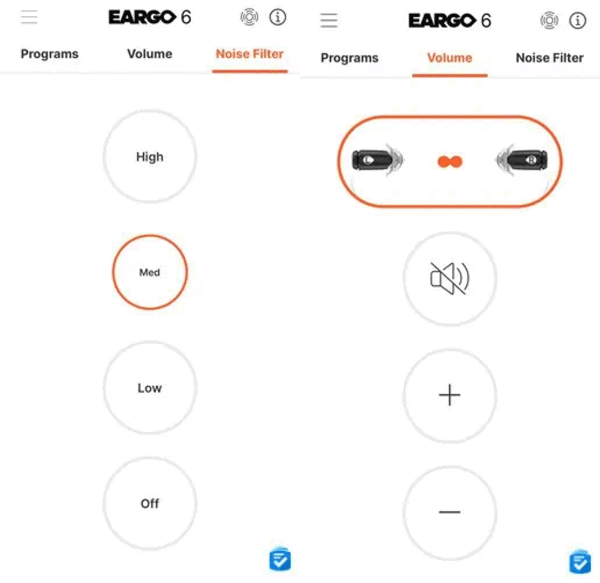
Eargo hearing aids do not offer an app or a dedicated tinnitus-related feature. However, they are still one of our favorites, as many people who use them report a reduction in tinnitus symptoms. Additionally, with the included lifetime support from Eargo hearing health professionals, you can fine-tune your hearing aids to suit your particular type of hearing loss.
To learn more about each of Eargo’s models, check out our Eargo hearing aid review.
Pros
- Nearly invisible when worn
- Automatic sound adjustments
- Remote adjustments via Eargo app
- Lifetime support from Eargo hearing professionals
Cons
- Suitable only for mild to moderate hearing loss
- No call or music streaming
Signia Styletto AX - Best Tinnitus Therapies
 View Pricing
Links to ZipHearing.com
View Pricing
Links to ZipHearing.com
What We Like Most:
- Wide range of styles
- Variety of tinnitus therapies
- Stellar sound quality
- Professional support — remote and in-person

Overview
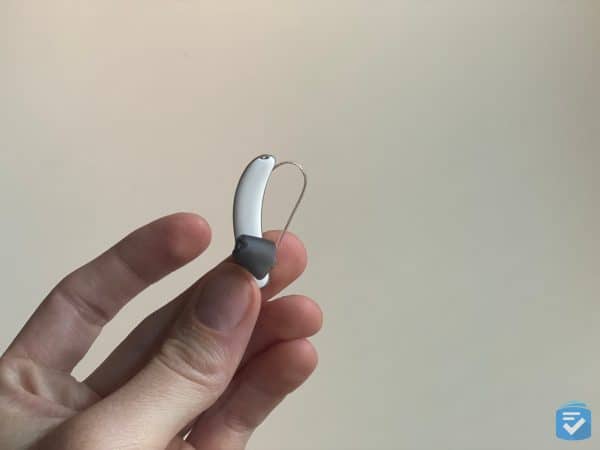
Cost for a pair: $2,500 – $5,000
Signia hearing aids provide a variety of gentle static background or ocean wave sounds to help soothe and mask your tinnitus. In addition to these more common treatment strategies, Signia also offers something called notch therapy. If you have tonal tinnitus (which sounds like one particular tone/frequency), sometimes amplifying that frequency can make it worse rather than better. Notch therapy provides amplification appropriate for your hearing loss across all the frequencies except the location of the tinnitus. Rather than distracting from or masking the sound, notch therapy works to help the brain ignore the sounds so that they fade further and further into the background.
Tinnitus therapy is included with most Signia models. These range from in-the-ear models to modern behind-the-ear models. A hearing health-care provider will be able to advise you on which model is best for your unique hearing situation and can double-check that the model you choose includes tinnitus therapy.

With the combination of their one-of-a-kind notch tinnitus therapy and static masking noise, Signia is one of the best choices for people dealing with tinnitus. The latter of which is available on a wide range of hearing aid devices.
To learn more about these hearing aids, read our hands-on Signia Styletto AX review.
Pros
- Dedicated tinnitus therapies
- Helpful Signia smartphone app
- Wide range of fits available
- Audio streaming on iPhones
Cons
- Must be purchased through a hearing health specialist
- No direct streaming for Android phones
Honorable Mentions
- Widex: Widex hearing aids impressed us with their Zen therapy, but their high prices prevented them from making the cut.
- Phonak: Phonak hearing aids have a number of sound-masking programs for tinnitus. However, much like Widex, their prices can be exceedingly high.
- MDHearing: MDHearing hearing aids are among the most affordable on the market. However, their lack of tinnitus programs, combined with limited adjustability, prevented them from getting a placement on the list.
What Causes Tinnitus?
There is no single cause for tinnitus; while it can be bothersome, it is usually completely harmless. It can be a symptom of an underlying condition, most commonly age-related hearing loss. However, it can be aggravated by substances like caffeine and some medications.
In rare cases, tinnitus can be linked to cardiovascular conditions, like high blood pressure, a small tumor called an acoustic neuroma, or head or neck injuries. If you have bothersome tinnitus that starts suddenly and is constant –– or is only present in one ear –– it’s best to get it checked out by your doctor.
Did You Know: Tinnitus can occur in one or both ears. Additionally, its noises may be present all the time, or they may come and go in a seemingly random fashion.
How Is Tinnitus Treated?
Just as there’s no one cause for tinnitus, there’s no definitive cure — especially if the cause is hearing loss. Some people get complete relief by wearing hearing aids to treat hearing loss. However, if that doesn’t help, many people find they can get some relief by using a combination of talk therapy, relaxation techniques, and deliberately using background noise to distract them from the sounds. Using a variety of techniques can decrease the awareness of tinnitus in everyday life and make it easier and less bothersome to live with.
Can a Hearing Aid Stop Tinnitus?
To understand the link between hearing loss and tinnitus, let’s talk for a minute about the hearing process. We hear because sound travels into our ears, and our auditory nerves take those signals to our brains. The brain’s job is to put together all this acoustic information and make sense of what we’re hearing.
Our ears don’t select what we hear; rather, they hear everything. So, our brains are tasked with filtering out unnecessary noises and background sounds, preventing us from getting overwhelmed by the many noises at any given moment. In cases of hearing loss (or other changes in the hearing system, such as an infection), our brains don’t get the same amount of information from our ears. One theory is that when our brains try to get more information and fill in the gaps, it can result in tinnitus.
If your tinnitus is directly related to hearing loss, simply restoring your hearing by using a hearing aid can help lessen the symptoms.
On top of this, some hearing aid manufacturers have taken things one step further. They’ve developed specific tinnitus-related features to help mask the sounds and make the condition more manageable.
In Closing
Tinnitus can be frustrating. Luckily, if it accompanies hearing loss, hearing aids can help manage it. If you suffer from hearing loss and are worried about tinnitus symptoms, we’d highly recommend booking an appointment with a hearing health-care provider to see how their tinnitus-specific features can help you.
To learn more about hearing aids and health, be sure to check out our helpful guides:
Hearing Aids and Tinnitus: Frequently Asked Questions
-
Why does my hearing aid worsen my tinnitus symptoms?
In rare instances, amplifying the frequencies can make tinnitus more noticeable to you instead of less. If your primary hearing complaint is tinnitus, it’s a good idea to look for a provider who specializes in the ailment; they can help with tinnitus-specific counseling and programming.
-
Can hearing aids cure tinnitus?
While there is no outright cure, just using hearing aids can sometimes provide enough sound input to make tinnitus imperceptible while wearing hearing aids. If this isn’t the case for you, certain types of hearing aids can also use noise patterns (ocean sounds, white noise, etc.) to mask its symptoms. So while the noise won’t technically be eliminated completely, it will become easier to ignore.
-
Why are tinnitus noises louder on some days than others?
The types of noises, their frequency, and loudness will vary from person to person — depending on the root cause of the tinnitus. With that said, variables like stress, caffeine, level of blood pressure, and alcohol intake can all exacerbate tinnitus symptoms, regardless of the root cause.

